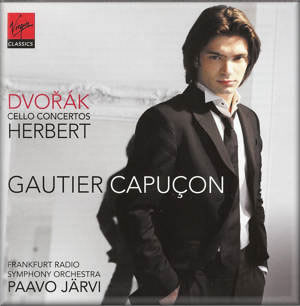![]()
CD Review
© Jonathan Woolf, August 2009
Also published by MusicWeb International
 |
Dvořák : Cello Concerto in B Minor Op104.
Herbert: Cello Concerto No 2 in E minor, Op 30.
Gautier Capuçon (cello), Frankfurt Radio Symphony Orchestra conducted
by Paavo Järvi.
Virgin Classics 5190352 • 61' •
This isn’t the first time these concertos have been conjoined.
Yo-Yo Ma recorded them in New York with Kurt Masur (Sony Classical SK67173)
nearly fifteen years ago. There was also a much less heralded disc on
Guild GMCD 7235 played by James Kreger and the Philharmonia Orchestra
under Djong Victorin Yu, a disc that hit the shops back in 2002. The reason
for placing both concertos alongside each other is the putatively influential
nature of the Herbert on the Dvořák . That said, what must have
stimulated the Czech composer - who had already abandoned an early effort
and was not therefore exactly unaware of the potential - was Herbert’s
clever orchestration and the way he allowed the cello to exploit registers
to enable it to sing and to be heard; that and the chance for reflective
soliloquies that Herbert offers the soloist, especially in the first movement.
Gautier Capuçon has been busy in the studios of late and he joins
the Frankfurt Radio Symphony Orchestra and Paavo Järvi for performances
made in May 2008. My main concern in this Frankfurt recording of the Dvořák
centres on the first movement which is subject to moments of stasis that
do nothing for the musical architecture of the work. They’re lovely
in themselves but amount to a full stop. The clarinet and flute themes
therefore dawdle and when the cello enters – with a rather nasal
tone – Capuçon makes deliberately heavy weather of his opening
statements. Dynamics and rubati are sometimes extreme and the whole thing
sounds somewhat ponderous – in tempo relationship terms this is
very similar to Rostropovich/Giulini recording. I don’t especially
like his climactic glissando or Capuçon’s over-emoted and
throbbing vibrato when he wants to make expressive points – hear
his mini groans if you doubt his commitment, which I don’t at all;
just the result.
The slow movement is better though there’s an ungainly slide at
around the two-minute mark. The recording doesn’t quite manage to
correlate the wind lines so that the dialogues between cello and wind
sound rather loose and undefined. But the playing here is an improvement,
most certainly, even if the greater depths of the music remain unplumbed.
More over-finicky dynamics return for the finale. And after all the hammer
dished out earlier the reminiscence of the second movement comes without
any great involving or moving power. I remained impassive even in the
face of the fine musicianship on show.
Herbert’s Concerto is a bluff but imaginative three movement one.
Registrations are adeptly chosen and as already noted he allows the soloist
considerable space for declamation and whispered confidences. Wind solos
in the central movement are duly plangent – certainly Andante tranquillo
but not a dirge and here played with an apposite sense of motion and lightness
and warm cantilena. Though the finale is a bit loquacious – and
repetitious – it’s accomplished nonetheless and receives an
appropriately breezy reading.
Without the same sense of a historical lineage in this work, Capuçon
sounds more comfortable here, more equable in a work that is in any case
a much more equable one. With the Dvořák , the greatest concerto
in the cellist’s repertoire, things are more equivocal.